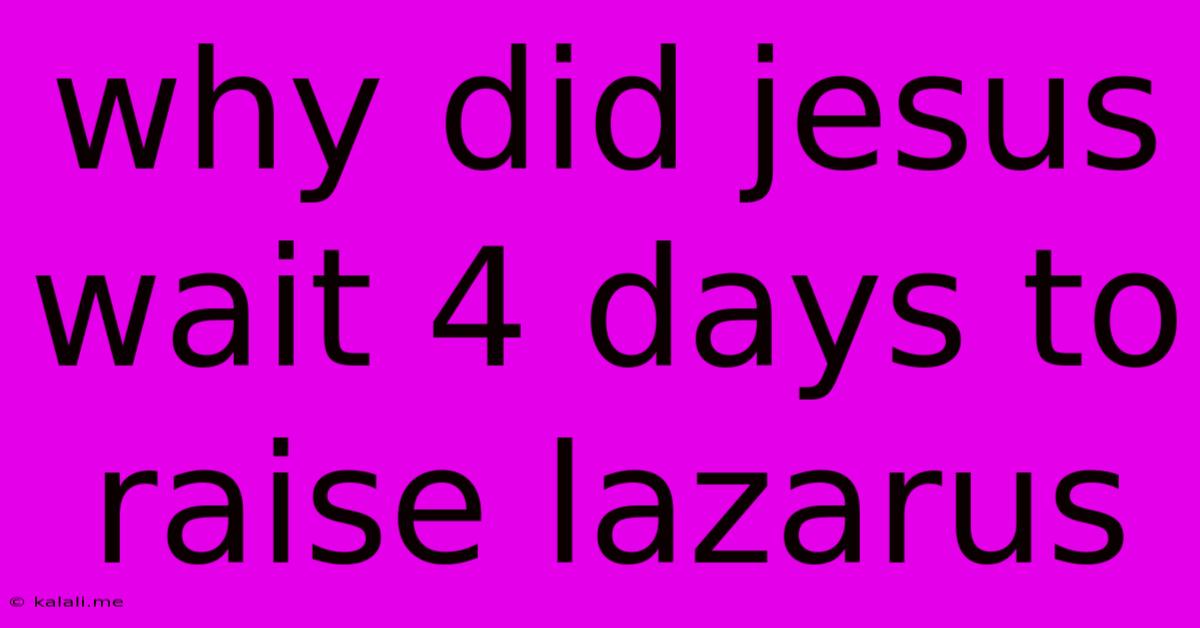Why Did Jesus Wait 4 Days To Raise Lazarus
Kalali
May 28, 2025 · 3 min read

Table of Contents
Why Did Jesus Wait Four Days to Raise Lazarus? Exploring the Significance of Delay
The resurrection of Lazarus, recounted in John 11, is one of the most powerful and moving stories in the Gospel. But why the four-day delay? Why didn't Jesus arrive sooner to prevent Lazarus's death? The seemingly deliberate delay holds profound theological significance, offering several layers of meaning that enrich our understanding of Jesus's power and mission. This article will explore the possible reasons behind this crucial narrative element, examining its implications for faith, miracles, and the nature of Jesus Christ.
The Dramatic Effect of Delay: A key aspect to consider is the dramatic impact of the four-day delay. By waiting, Jesus heightened the tension and emphasized the absolute nature of his power. Lazarus wasn't merely ill; he was demonstrably dead, his body already beginning to decompose. This isn't a case of a near-death experience; it's a clear-cut instance of death, making the miracle even more profound and undeniable. The delay intensifies the sisters' grief and desperation, amplifying the impact of Jesus's ultimate act of compassion. This dramatic unfolding serves as a powerful illustration of divine power overcoming the ultimate human limitation: death.
Illustrating the Power Over Death: The delay serves to showcase Jesus's authority over death. The four days weren't simply a logistical inconvenience; they were a necessary stage in highlighting the miracle's magnitude. The longer Lazarus was dead, the more miraculous his resurrection becomes, solidifying the message of Jesus's ultimate triumph over death. This dramatic display wasn't just for the benefit of Lazarus's family; it was a public declaration of Jesus's divine power for all who witnessed it. The event underscores the concept of eternal life and Jesus's power to grant it.
A Testament to Faith: The delay also presents an opportunity for Martha and Mary to demonstrate their faith. Their initial responses, ranging from hope to despair, reveal the human struggle with grief and doubt in the face of death. Martha's statement, "Lord, if you had been here, my brother would not have died," reflects a profound faith, even amidst her sorrow. Her faith, tested by the delay, ultimately leads to her powerful declaration: "I believe that you are the Christ, the Son of God, who is coming into the world." This shows how trials of faith, even prolonged suffering, can lead to a deeper understanding and affirmation of belief. This strengthens the theme of faith and its transformative power.
A Sign for Believers and Unbelievers: The resurrection of Lazarus wasn't just a private act of mercy; it served as a powerful sign, intended for both believers and unbelievers. For the disciples, it reinforced their faith and conviction in Jesus's messianic identity. For skeptics, it presented irrefutable evidence of Jesus's divine nature and authority. This dual purpose underscores the significance of miracles as both demonstrations of power and calls to faith. The event is a pivotal moment in the Gospel narrative, leading directly to the events of Jesus's own crucifixion and resurrection.
Preparing the Stage for Jesus's Own Resurrection: Finally, the narrative of Lazarus's resurrection serves as a powerful foreshadowing of Jesus's own resurrection. The raising of Lazarus from the dead is a smaller-scale reflection of the greater miracle to come. The imagery and thematic elements—death, grief, faith, and ultimate triumph—are all echoed in the narrative of Jesus's death and resurrection, connecting the two events thematically and highlighting the eschatological significance of Jesus's ministry.
In conclusion, the four-day delay in raising Lazarus wasn't a simple oversight; it was a deliberate narrative choice laden with theological significance. It heightened the drama, showcased Jesus's power over death, tested the faith of his followers, and served as a powerful sign for believers and unbelievers alike, ultimately foreshadowing Jesus's own resurrection. The story offers profound insights into faith, grief, and the ultimate triumph of life over death.
Latest Posts
Latest Posts
-
How To Remove Labels From Wine Bottles
May 30, 2025
-
Can You Lay Vinyl Flooring Over Tile
May 30, 2025
-
How Do You Find Your Whatsapp Number
May 30, 2025
-
How Do You Make Super Powers
May 30, 2025
-
Will Usb Mini Reciever Work On Regular Usb Ports
May 30, 2025
Related Post
Thank you for visiting our website which covers about Why Did Jesus Wait 4 Days To Raise Lazarus . We hope the information provided has been useful to you. Feel free to contact us if you have any questions or need further assistance. See you next time and don't miss to bookmark.